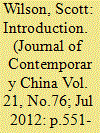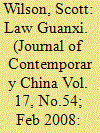|
|
|
Sort Order |
|
|
|
Items / Page
|
|
|
|
|
|
|
| Srl | Item |
| 1 |
ID:
112827


|
|
|
|
|
| Publication |
2012.
|
| Summary/Abstract |
Since 1978, China has opened itself, not just to the global economy, but also to social movements and non-governmental organizations (NGOs) in global civil society. Scholarship on Chinese NGOs and civil society has reflected these developments, contrasting the state's early attempts to eradicate and control civil society organizations with more recent acceptance of, and even reliance on, the NGO sector. Two factors-linkages between Chinese NGOs and international actors and online communications-have propelled Chinese civil society development. Yet, Chinese civil society remains uneven across geographic and issue areas. This introduction examines the opportunity structures presented to Chinese NGOs by international and online linkages, as well as introduces the articles collected in this special section (in two parts).
|
|
|
|
|
|
|
|
|
|
|
|
|
|
|
|
| 2 |
ID:
080717


|
|
|
|
|
| Publication |
2008.
|
| Summary/Abstract |
Since 1978, China has opened itself to foreign direct investment and has undertaken significant legal reform, especially in the area of international commercial arbitration. I analyze the roles that foreign actors and state officials have played in changing Chinese legal institutions such as the Chinese International Economic and Trade Arbitration Commission (CIETAC) and personal relations, or guanxi.1 Foreign investors, attorneys, and non-governmental organizations are helping China to adopt formal commercial arbitral institutions that follow international norms. In that sense, foreign actors are contributing to rule of law in China. Yet, foreign investors also attempt to use guanxi to get around central regulations, thereby contributing to informal legal institutions. The combination of guanxi and formal legal institutions follows a model of path dependent institutional change. I use the terms, 'layering' and 'bricolage' to elucidate the ways that actors combine existing institutions with new legal forms introduced by foreign investors, attorneys, and NGOs.
|
|
|
|
|
|
|
|
|
|
|
|
|
|
|
|
| 3 |
ID:
114232


|
|
|
|
|
| Publication |
2012.
|
| Summary/Abstract |
Over the last two decades, international actors have sought to diffuse repertoires of contentious practices, including rights-based litigation, to China. Multilateral organizations, foundations, and international non-governmental organizations (INGOs) have used funding and training programs conducted in China and at law schools abroad in order to raise the capacity of Chinese attorneys, NGOs, judges, and legal officials to improve rule of law and protection of human rights. In particular, international actors have worked with Chinese NGOs and state officials to found legal aid centers that provide information and advocacy to protect the rights of pollution victims and AIDS carriers. Legal aid centers, attorneys, and their financial backers seek to bring forward 'impact litigation' cases in the courts to establish model decisions for other plaintiffs, attorneys, and judges to follow. To date, environmental groups have enjoyed more success gaining access to the courts and in receiving favorable court judgments than have AIDS groups. In many cases involving AIDS victims, attorneys and legal aid centers seek compensation through alternative dispute resolution methods rather than litigation, which do not establish a legal precedent. This paper explores the reasons for the divergent outcomes of efforts to protect the rights of pollution victims and AIDS carriers in the courts. Primarily, the institutional particularities and contexts of the Ministry of Environmental Protection and the Ministry of Public Health have allowed international legal norms related to the environment to take deeper root than those related to AIDS.
|
|
|
|
|
|
|
|
|
|
|
|
|
|
|
|
|
|
|
|
|